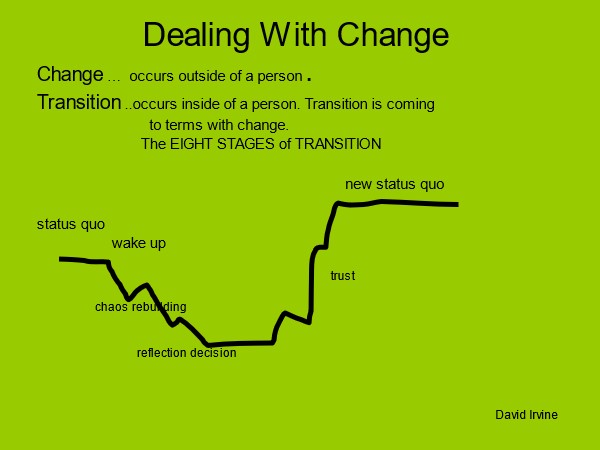
By Don Campbell
Last month I wrote about how I think we may be facing some major changes in our society in the near future. That was personal opinion, it may or may not come to pass. In my next few blogs, I want to present ideas that may be helpful whether things carry on as they have in the past or we see major change.
It is important to recognize that change is inevitable. It is happening all the time. We can’t avoid change. Knowing this it might be wise to learn how to welcome change and use it to our advantage.
I remember Allan Savory talking about change. His example was: “You can’t step in the same river twice.” At first, I thought, Allan is wrong, I can step in the same river twice. As I reflected, I realized Allan was correct. By the time I stepped in the second time, the current had moved the water; I was now stepping into new water. Other subtle changes have also occurred. Life is like that; it is continually changing.
Change happens outside of us. Transition occurs inside of us. Transition is dealing with the change and moving onto a better life. There are eight stages to transition. We begin with the status quo, that’s how things are today. A wake-up call comes along, this could be any number of things. Examples of a wake up call might be: marriage, divorce, birth, death, flood, drought, the list goes on and on.
The next step is chaos. We are confused. We ask questions like why did this happen? How can I deal with it? What do I do now? Our first reaction is to want to go back to how it used to be. Whether our previous state was good or bad it was familiar and that’s what we yearn for.
Rebuilding follows chaos. We realize that things have changed. We are required to deal with the change.
Reflection comes next. We realize that the change occurred. We realize we must deal with it. We are in charge.
Decision follows reflection. We plan to move ahead.
Trust is the final step. We trust that we will find our way to a new status quo. We believe in ourselves and our support system.
Hopefully the result of the wake-up call with be a better new status quo. We have faced adversity. We have adjusted. We are now stronger, better people. This is a cycle we can repeat over and over throughout our lifetime.

Change
Make change your best friend.
The most important thing is to change how you think. Change your paradigms.
Not all change is good. What are we committed to preserve?
In the midst of change keep an open heart.
Principles for Change
Maintain a balance between achievement (what I do) and connection (my relationships).
Develop your self awareness. (Journalling may help here).
Take responsibility. You are in charge.
Make time to communicate.
Develop clear priorities and direction. (Review your goal).
Have a solid foundation. You are not alone. Lean on your:
Family, Friends and Faith.
Change is inevitable. Developing a way to deal with change is valuable. Dealing with change is like so many things. The more you do the easier it becomes. In the last 40 years I have become more open minded. This occurred because I have found better ways to do things that I thought I already knew. I was challenged and willing to change my paradigms.
If you want to make small change,
Change how you do things.
If you want to make big change,
Change how you see things.
You can live your dream. I wish you every success. I believe in you.
Happy Trails
Don
